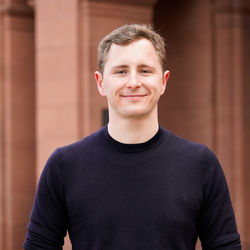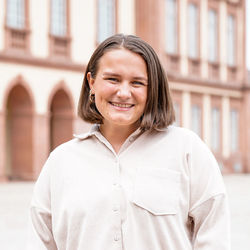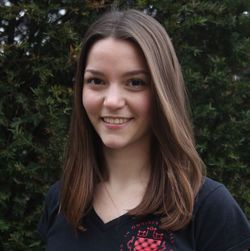Bachelor's Program in Teacher Education: French
Program facts and information
Degree: Bachelor of Education (B.Ed.)
Standard period of study: 6 semesters (3 years)
ECTS credits: 180
(70 in French, 70 in a second subject, 19 in Education Sciences, 15 in Teaching Methodology, 6 in the bachelor's thesis)Language of instruction: German and French
Language requirements: This program requires proficiency in French, basic knowledge of a second Romance language and basic knowledge in Latin (may be acquired later on).
You can prove your language proficiency if you have taken this subject in school or by taking a language test. For more details, please refer to the information sheet on proofs of language proficiency.
If you are not a German citizen or do not have a German university entrance qualification (Abitur or equivalent qualification), you must submit proof of proficiency in German on C1 level.Program start: Fall semester (September)
Academic calendarSchool: School of Humanities
Semester fee: EUR 194 (more information)
Tuition fees for international students from non-EU countries: EUR 1,500
Tuition fees for a second degree: EUR 650Program overview
Students of the bachelor’s program in Teacher Education: French study French, a second equally-weighted subject, Education Sciences and Teaching Methodology.
Modules in French teach you about French literature, culture and linguistics.
During modules on Literary Studies, you will use literary theories to analyze French literature and media, focusing on the topics, language, author, period, and genre. The reading ranges from Honoré de Balzac and Albert Camus to post-colonial literature.
Courses on culture focus on regional, cultural, and historical characteristics of France and French-speaking countries. Linguistics modules teach you about the development and functions of language, and linguistic features and structures. The program also concentrates on improving your level of language proficiency.
You address the practical, basic principles of foreign language lessons at school in modules on Teaching Methodology: Which methods can I use to teach pupils grammar and vocabulary? Which media can I use?
In interdisciplinary classes, you explore the challenges that come with teaching multicultural and multilingual groups.
Courses in Education Sciences cover the basic scientific principles behind teaching and learning, and are complemented by the practical experiences gained during the first school placement (Orientierungspraktikum).
Why study Teacher Education: French at the University of Mannheim?
The Bachelor of Education program at the University of Mannheim prepares students for a teaching career right from the start and places a focus on teaching linguistically and culturally diverse groups of students.
Our students particularly value that the Department of Romance Languages teaches them important modern literary and linguistic principles. Students are taught in small groups. Academic advisors, program managers, and teachers are happy to answer your questions on the program.
Career opportunities
After completing the program, graduates have a wide range of further education and career options. The traditional career path is working as a school teacher. If you want to become a teacher, you need to pursue a master's program in Teacher Education (Lehramt Gymnasium) to be admitted to the preparatory service (Referendariat). You are then allowed to teach at secondary or vocational schools. Please note that you can only teach at secondary schools if you study the subject combination History and Political Science as well as Economics and Business Administration.
Alternatively, you can build on the skills learned during your bachelor’s program by studying a master’s program in a literary, cultural or linguistic field. You can then work, for example, in the cultural sector, in human resources departments, or in continuing or adult education.
Required interests and skills
Students of French should
- enjoy analyzing French literature, language and culture,
- ideally, have a good level of proficiency in French at the start of the program,
- not be put off by complex texts, theories, and methods,
- read frequently (in French, German, and English),
- be capable of critical thinking and like discussing topics,
- enjoy writing academic texts.
Students of Teacher Education should
- like working with young people and understand their problems,
- enjoy presenting and explaining things,
- be confident,
- be enthusiastic about their subjects and the job, and be able to pass this enthusiasm on to others,
- be able to accept criticism and reflect on themselves,
- communicate in a clear and understandable manner.
Program structure
Module catalog
You can find further details on how the program is structured in the module catalog.Studying abroad
In the teacher education programs, there are diverse and exciting opportunities for studying abroad. The University of Mannheim is part of a global network and is partners with about 450 universities worldwide. The International Office can help you plan a period of study abroad. We recommend that students go abroad during the fifth subject-specific semester. Studying abroad is optional, and is encouraged by the School. Coursework and examinations completed abroad can usually be recognized so that the period of study does not have to be extended.Internships
All students of bachelor's programs in Teacher Education in Baden-Württemberg complete their first school placement (Orientierungspraktikum) during the program. The placement lasts for three weeks, and gives students the chance to gain initial practical experience during their studies.Students at the University of Mannheim attend a block seminar while completing their placement. Both the placement and the seminar usually take place during the semester break before the third semester begins (June/July).
Students can either do their placement at a secondary school (Gymnasium) or a vocational school. The Center for Teacher Education and Educational Innovation can answer your questions on the application process and the format of the placement.
Sample course schedule
These courses (PDF, 98 kB) are studied in the first semester.Continuing Education
Certificate programs
Strengthen your potential, deepen your knowledge, find solutions for challenges we will face tomorrow – there are many good reasons to think outside the box, get to know and try out new things even during your studies.At the University of Mannheim, you can do this in the “Studium Oecologicum” which focuses on sustainability. In our certificate program, you will acquire interdisciplinary expert knowledge which can help you to act ethically and to make holistic decisions.
Language courses
Making language learning easier: No matter if you want to learn Japanese, Hebrew, Spanish or Norwegian, take the Graduate Record Examination Test (GRE), The European Language Certificates (telc) or the TOEFL test – each semester, the University of Mannheim offers language courses and language certificates in more than 16 languages for students and non-university members, online and on campus!Studium Generale
Are you interested in IT or communication trainings or theater, music, or drawing courses? Studium Generale has a vast range of courses available to all.Further study
The following degree programs are (mainly) taught in German:
Master’s program in Teacher Education (M.Ed.)
Master’s program in Language and Communication (M.A.)
Master's program in Literature, Media and Culture in the Modern Era (M.A.)
Master’s program in Intercultural German Studies (M.A.)
Master’s program in Culture and Economy: French Studies (M.A.) (If you chose French and Economics and Business Administration as your two main subjects for the Bachelor of Education program.)
Application and selection
At the University of Mannheim, a traditional numerus clausus (within the meaning of a minimum grade required for admission) does not exist. In our selection process, we take numerous criteria into account. For more details, please check the selection statutes (see below). Be bold! Please do not hesitate to contact us if you need advice. We are looking forward to receiving your application!
In our selection process for the Bachelor's Program in Teacher Education: French, we take the following criteria into account:
- the grade average achieved in your university entrance qualification,
- the grades achieved in German, English, Mathematics, and a foreign language,
- relevant work experience and extracurricular activities.
German language proficiency
If you are not a German citizen or do not have a German university entrance qualification (Abitur or equivalent school leaving certificate), you must prove German language proficiency at C1 level.Selection statutes
Under “Application and selection” we have compiled the most important selection criteria of the program for you. For more detailed explanations of the selection process and the legally binding requirements of the degree program, please refer to the selection statutes.If the program of study is currently not selective, you will receive a study place if you fulfill all admission requirements and apply in due time and form.
Scholarships and funding
The university offers various funding opportunities. Around 200 Mannheim students receive scholarships every year, which are intended to give them the freedom to focus on their academic achievements or to continue their voluntary work alongside their studies. Find out more about the funding opportunities and feel free to apply, for example, for the Deutschland Scholarship, the Opportunity Mannheim Scholarship or the Elite Sports Scholarship Rhine-Neckar Metropolitan Region.Funding opportunities for international degree-seeking students
Application
- The application deadline for our bachelor's programs for the fall semesters starts on 1 June and ends on 15 July.
Contact
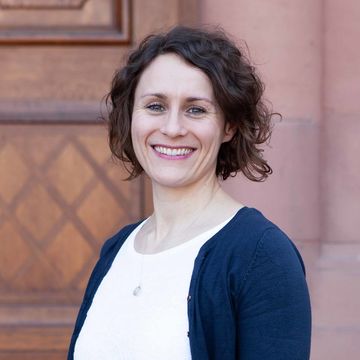
Sarah Kern, M.A.
School of Humanities
Schloss – Room EO 286
68161 Mannheim
Tue 10–12 a.m. – Office consultation hours
Wed 10–12 a.m. – Online consultation hours
Please book an appointment for the consultation hours via https://www.phil.uni-mannheim.de/en/academics/virtual-office-hours/
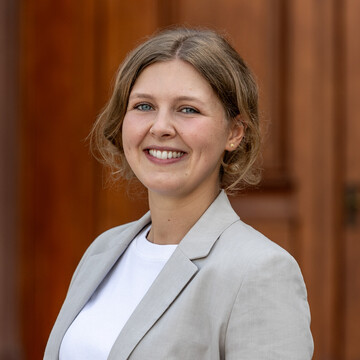
Laura Grabarek, M.A.
School of Humanities
Schloss – Room EO 282
68161 Mannheim
Tue 10–12 a.m. – Office consultation hours
Wed 10–12 a.m. – Online consultation hours
Please book an appointment for the consultation hours via https://www.phil.uni-mannheim.de/en/office-hours-teacher-education-programs/
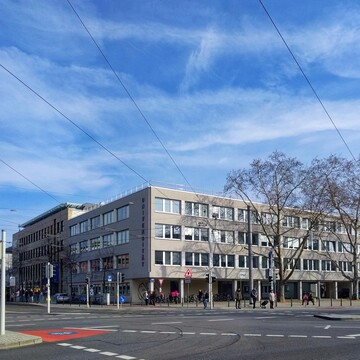
Admissions Office
L 1, 1 – Room 157, 158
68161 Mannheim

